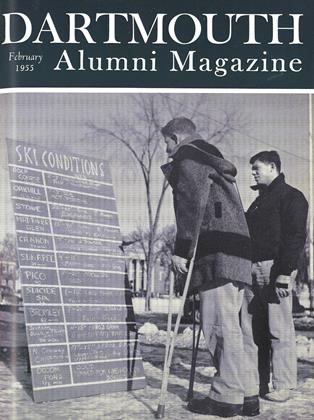"Duke" Cassels-Smith is the only fellow we have ever known who moved out of the state so he could live with a dog. But Ghillie, a black Labrador Retriever, is an exceptional dog. A college regulation prevents dogs, exceptional or otherwise, from living like students, and so Duke crossed the river to lead a dog's life. It was important that they be together because, like a middleweight contender and his manager, they have to train. In this case Duke knocks 'em down and Ghillie drags 'em out. Unfortunately, ducks schedule relatively few flights along the Connecticut River and so there is a lot of waiting to be called in the cold marshes up Orford way. More waiting, that is, than they had at Duke's home in Maryland over last Christmas vacation, where it is possible for a hunter to get more ducks in a day than he gets in a season near Hanover. They were joined by Duke's father (George R. Cassels-Smith '25), a dealer in leaf tobacco. Ghillie performed splendidly and Duke felt well rewarded for the many afternoon practice sessions.
Duke traded the fine Maryland duck hunting for an English major at Dartmouth and some fine New Hampshire trout fishing and upland bird shooting; he won't say whether the trade was even. His pleasure in being a member of the Glee Club for four years might swing the balance, but we wouldn't ask.
Duke prepared for Dartmouth at the Gilman Country School in Baltimore where he played football and lacrosse and was on the wrestling team. His Undergraduate Chair in the ALUMNI MAGAZINE reflects his interests in hunting and fishing. He has ranged far be- yond the nearby Mascoma River and the bird cover up on Balch Hill. In four years he has learned as much as many hunters have absorbed in a lifetime about the terrain for a radius of twenty miles or more. His precisely marked maps of grouse cover could get quite a price on the open market, but will probably be passed on to some "deserving freshman."
His enthusiasm for fishing once very nearly cost his life. In the spring of his sophomore year they were taking fine brown trout out of the Mascoma, even though the water was higher than usual. In several runs where the stream is squeezed together the rapids were treacherous but it was exciting fishing. Duke put on his chest-high waders with some difficulty because his left arm had been strapped to his chest after the aggravation of an old shoulder injury.
He hooked the big one in a long pool that tipped into one of the rapids. The fish struck and swam off crazily toward the white water, with Duke holding the rod up high in his good hand trying to keep the line just taut enough to hold him. Duke moved out into the slick water where it wrinkled into the rapids. The fish went around a snag. Duke tried to hold the rod even higher, slipped and was sucked under by the rush of water. His waders filled up and he floundered, helpless. With two good arms he would have had a difficult time, but with one he couldn't even try to swim. Instinctively he reached up for something that would save him. With that wonderful luck that keeps fishermen alive, he caught the alder snag and held on. He tells the story with a sort of detached interest, his most serious comment is about the trout. "Sorry to miss him, he felt like a fine fish."
Duke just volunteered for the Marine Corps. We think he is just the sort of man on whom the strength of the Corps has been built. His gracefully courteous manner is backed up by physical strength, a love of the outdoors and a fine mind that likes to wrestle with modern poetry and criticism. When they're picking 'em this spring (the boys we will remember after they have left Hanover), a lot of us in town will be talking about Duke, and Ghillie and we will be happy to think how pleasant it will be to have them come back for a visit once in a while.
"Duke" Cassels-Smith '55
 View Full Issue
View Full Issue
More From This Issue
-
 Feature
FeaturePublic Interest an The Technological Revolution
February 1955 By LLOYD V. BERKNER -
 Feature
FeatureMan's Aggressive Nature
February 1955 By GEORGE E. GARDNER '25 -
 Class Notes
Class Notes1918
February 1955 By ERNEST H. EARLEY, W. CURTIS GLOVER, RICHARD P. WHITE -
 Class Notes
Class Notes1923
February 1955 By CHESLEY T. BIXBY, CHARLES H. JONES JR., TRUMAN T. METZEL -
 Class Notes
Class Notes1926
February 1955 By HERBERT H. HARWOOD, H. DONALD NORSTRAND, RICHARD M. NICHOLS -
 Article
ArticleThe Underĝraduate Chair
February 1955 By G. H. CASSELS-SMITH '55
Article
-
 Article
ArticlePROFESSOR LAMBUTH AWARDED HONOR IN CONTEST ON CONRAD
December, 1925 -
 Article
ArticleJohn M. Comstock '77
December 1947 -
 Article
ArticleDARTMOUTH UNDYING
SEPTEMBER 1988 -
 Article
ArticleTwo Centuries of Fine Tuning
MAY 1991 -
 Article
ArticleEnglish Professor William Spengemann:
October 1992 By Karen Endicott -
 Article
ArticleThe Cover
February 1935 By The Editors

